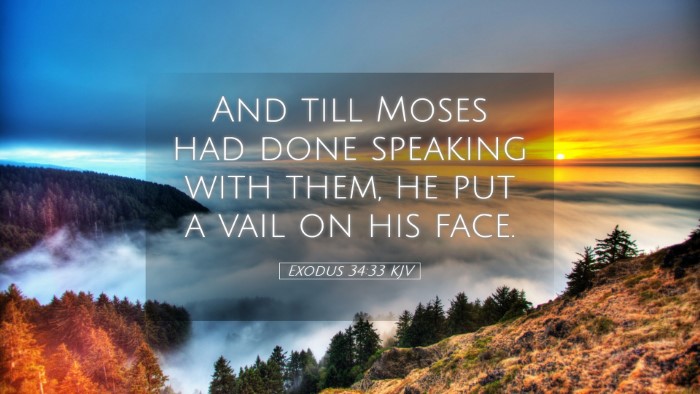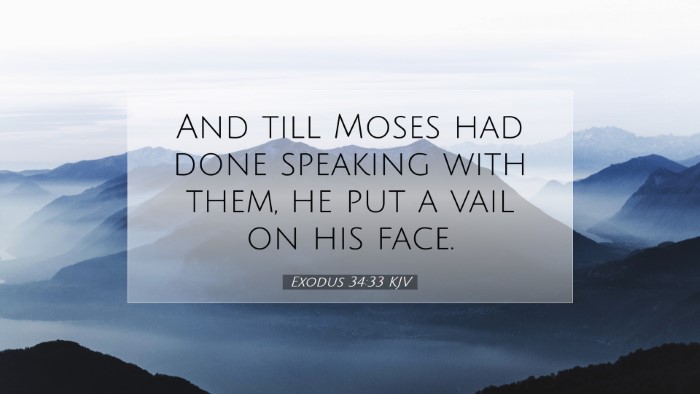Bible Commentary on Exodus 34:33
Verse Overview: Exodus 34:33 describes the aftermath of Moses receiving the Ten Commandments from God. Upon descending from Mount Sinai, Moses' face shone with the glory of God, resulting in a physical manifestation of His divine presence.
Contextual Background
The events leading to Exodus 34:33 are of great significance. Moses had been on Mount Sinai, engaging in profound communion with God, receiving not only the laws that would govern Israel but also a unique understanding of God’s nature. This chapter marks a pivotal moment in the covenant relationship between God and Israel.
Commentary Insights
Moses' Shining Face
“And till Moses had done speaking with them, he put a veil on his face.” (Exodus 34:33) The phenomenon of Moses' radiant face is emblematic of the transformative power of direct communion with God. Matthew Henry comments that this visible glory was a reflection of the glory of God Himself, indicating the profound change that comes when one is in the presence of the Divine.
Spiritual Implications
Henry draws out the theological significance of Moses veiling his face. The veil symbolizes the separation between humanity and the full glory of God—representing the need for reconciliation. In Christ, this separation is overcome, as believers are called to reflect God's glory without a veil (2 Corinthians 3:18). The unveiled face of Moses provides a foreshadowing of the ultimate revelation of God through Jesus Christ.
The Veil and its Purpose
Albert Barnes elaborates on the necessity of the veil in the context of the people’s reaction to Moses. The glory of God on Moses’ face was so intense that it frightened the Israelites, hence the need for the veil to mediate the intensity of God’s presence. Barnes emphasizes that the veil allowed Moses to communicate with the people without overwhelming them, symbolizing the gradual revelation of God's glory to humanity.
Theological Reflection
From a theological perspective, the concept of veiling signifies the gradual nature of revelation. Adam Clarke observes that the veil served as a means of protection for the people, who were not yet prepared to fully embrace the holiness of God as manifested in His servant. This concept ties into the greater narrative of salvation history, where God progressively reveals His nature through covenants leading to the New Testament.
Implications for Leadership
This passage is often scrutinized for its implications for spiritual leadership. Moses’ radiant face, coupled with the veil, illustrates that leaders are to reflect the glory of God while also being sensitive to the needs and limitations of those they lead. A godly leader requires humility and understanding in the act of guiding others into the presence of God.
Practical Application
Modern leaders, particularly within the church, can draw from Moses’ experience. Just as Moses had to reconcile his radiant relationship with God to the daily realities of his people's lives, contemporary spiritual leaders are called to be approachable, reflecting God’s glory through their character and actions, while also being sensitive and accommodating to the spiritual capacities of their congregations.
Conclusion
Exodus 34:33 encapsulates a transformative moment in biblical history, demonstrating the profound effects of communion with God. The commentary by Matthew Henry, Albert Barnes, and Adam Clarke provides rich insights into the significance of Moses' shining face and the implications of the veil, connecting them to broader themes of revelation, leadership, and God's relationship with humanity. In reading this verse, pastors, students, and theologians are reminded of the continual call to engage with God’s presence, reflecting that glory into the world.
Reflections for Further Study
- Consider the implications of Moses' experience for understanding our own encounters with God.
- Reflect on how the theme of veiling and unveiling plays a role in the New Testament.
- Examine the responsibilities of spiritual leaders as refleks of divine glory in their communities.


